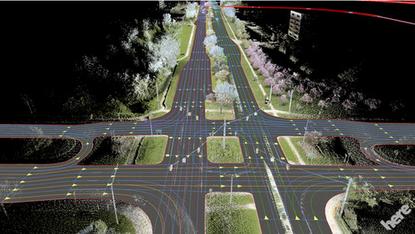Nokia Here said to be snatched up by Audi, BMW and Daimler for US$2.7B
- 22 July, 2015 05:52

Nokia Here digital mapping technology.
Audi, BMW and Daimler will jointly purchase Nokia's Here digital mapping service for roughly $2.7 billion, and they plan to invite other auto makers to take a stake in the company as well, according to reports published on Tuesday.
The deal could be signed in the next few days, with an announcement targeted for next week, according to separate reports in the Wall Street Journal, Bloomberg and German publication Manager Magazin. All reports were based on anonymous sources familiar with the deal.
Uber reportedly dropped out of the bidding processes several weeks ago.
Neither Nokia nor Audi responded to a request to comment for this story. BMW and Daimler declined to comment.
Here builds high-definition maps and combines them with cloud technology for access via a broad range of connected devices, including self-driving cars. On Monday, Here announced that it is making data on sections of public roads in four countries available to all automotive companies for automated vehicle tests.
Reportedly, Nokia had been hoping to receive as much as $4 billion for its Here technology.
"Nokia has got to be disappointed" by the purchase price relative to both the $4 billion it hoped to get and the roughly $8 billion it paid for Navteq back in 2007, said Greg Sterling, vice president for strategy and insights with the Local Search Association.
Navteq was integrated into Nokia Location & Commerce, which later became Here.
Still, the sale completes the company's shift into wireless equipment manufacturing, Sterling noted.
The German group's acquisition of Here is at least partially a defensive move, he added.
"They were all users of the product and see maps and navigation as a critical component of the self-driving car future," Sterling explained. "Had Here gone to a U.S. or Chinese company, it's not clear they would have continued to have the same level of service or access."
What remains to be seen is how much the companies continue to invest in and develop the platform and underlying data. Digital mapping is not a "set it and forget it" marketplace, but instead requires constant investment and attention to remain competitive, according to Sterling.
Also awaiting the test of time is the question of how well the auto makers can make a joint ownership work.
"At the end of the day, they're still competing with each other," noted Ramon Llamas, a research manager with IDC.
Each company will have to decide how to differentiate its own products on top of the jointly owned technology, for instance, and whether or not to license its developments back to its partners, Llamas pointed out: "It can get very messy."
The fact that the German car companies chose to buy Nokia's technology outright rather than license from competitors such as TomTom, Magellan or Google suggests that current licensing arrangements with those alternatives might be even more expensive, Llamas said.
Still, "$2.7 billion and you're lying in bed with some of your closest competitors?" he said. "There could be some challenges down the line."
